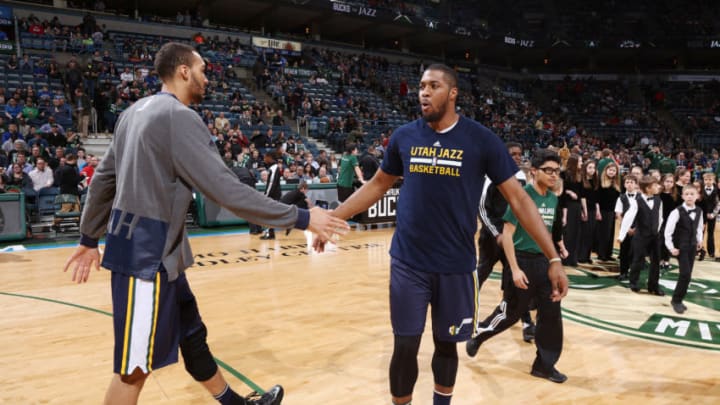How good does the Utah Jazz offense need to be?
By John Keeffer

Increased turnovers will lead to easy baskets
There were very few holes in the Utah Jazz defense last season. They were first in points allowed per game, third in defensive rating, third in opponent effective field goal percentage, fourth in defensive rebound percentage, and eighth in blocks per game.
The one glaring weakness, however, was creating turnovers. It may have been part of the game-plan, as the defensive focus seemed to be about forcing bad shots and not forcing turnovers. Still, the Jazz were bottom 10 in turnover percentage, and second to last in steals per game with 6.7.
That is going to be one of the most improved areas of the Jazz defense this year, and why they should have an easier time getting above that 96-point threshold. I expect the Jazz steals per game average will jump to just above eight per game. That should put them at or near the top 10 in the NBA.
Newcomers Ricky Rubio, Thabo Sefolosha and Donovan Mitchell should be the biggest boost to this.
Ricky Rubio
Since starting his career in 2011, Rubio has been a terrific defensive player, and one of the league leaders in steals. In a “down” year last season, he still averaged 1.7 steals per game. He has averaged 2.1 steals a game for his career, finished in the top 10 for steals four times and even led the league in steals during the 2013-14 season at 2.3 per game.
Needless to say, he is a pest in the backcourt. What he lacks athletically, he makes up for with long arms, high intelligence and anticipation.
Thabo Sefolosha
Sefolosha has been a premier defender in the league throughout his entire career, and at 6-foot-7 with a 7-foot-3 wingspan, it’s not hard to see why. I recently wrote an article on the case for Sefolosha to start; his capabilities as a defensive stopper were a major part of that argument.
He finished in the top 20 of the NBA in many of the defensive metrics. Namely, steals per game (16th), steal percentage (fifth), defensive plus/minus (fifth), defensive RPM among small forwards (seventh) and defensive rating (11th). He was also fifth among wings in points saved according to NBA Math.
Donovan Mitchell
As a rookie, the best way he can make an impact on this team is going to be by playing suffocating defense. With a 6-foot-10 wingspan and elite athleticism, he can guard anyone from point guards to small forwards. What sets him apart, though, is his intensity on that end of the court.
In a recent piece by fellow J-Notes contributor Hayden Van de Maat, he said:
"It’s my belief that withdrawing Ingles or Sefolosha from the starting unit in exchange for Mitchell will in no way impact their killer defensive DNA. Mitchell is an NBA-ready defender with animal-like instincts on D."
Just look at him locking down a bigger Jaysum Taytum.
😤#UtahJazzSL https://t.co/JyczAu8sRf
— Utah Jazz (@utahjazz) July 7, 2017
Those three players alone could get to a combined five steals per game, with Rubio at two, and Sefolosha and Mitchell both around 1.5. Then Ingles, Exum and Favors are each capable of getting just one steal per game to bring Utah to at least eight.
More turnovers created means more offensive possessions, and with Rubio being one of the league’s best transition point guards, those turnovers are more likely to lead to easy baskets on the fast break. This should drastically help Utah’s ability to score over 96 points per game.